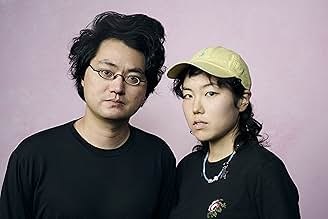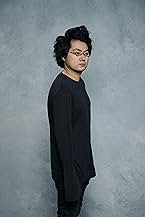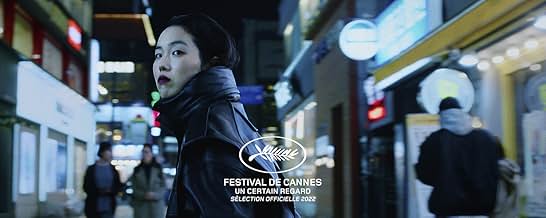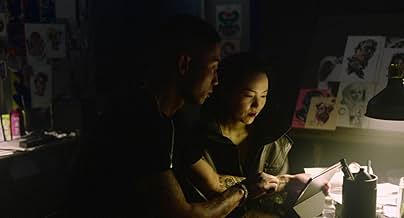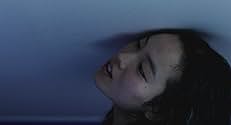IMDb-BEWERTUNG
6,9/10
9977
IHRE BEWERTUNG
Eine Französin kehrt zum ersten Mal nach Korea zurück - dem Land, in dem sie geboren wurde, bevor sie von einem französischen Paar adoptiert wurde. Sie beschließt, ihre leiblichen Eltern aus... Alles lesenEine Französin kehrt zum ersten Mal nach Korea zurück - dem Land, in dem sie geboren wurde, bevor sie von einem französischen Paar adoptiert wurde. Sie beschließt, ihre leiblichen Eltern ausfindig zu machen.Eine Französin kehrt zum ersten Mal nach Korea zurück - dem Land, in dem sie geboren wurde, bevor sie von einem französischen Paar adoptiert wurde. Sie beschließt, ihre leiblichen Eltern ausfindig zu machen.
- Auszeichnungen
- 10 Gewinne & 25 Nominierungen insgesamt
Heo Jin
- Grandmother
- (as Jin Heo)
Régine Vial
- Gisèle Benoît
- (as Régine Vial Goldberg)
Shin Dong-ho
- Tena's Father
- (as Dong-ho Shin)
Empfohlene Bewertungen
Return to Seoul is a captivating film that presents an intimate and complex portrayal of Freddie, although the larger context of her life is missing. However, the film's commitment to staying in the moment keeps the audience engaged. While the film does not have a strong emotional impact, it remains focused on Freddie's search for her identity and origins. Nevertheless, the movie lacks originality and does not distinguish itself from other films with similar themes. Despite this, Return to Seoul is still a well-made film that provides a compelling character portrait, albeit with some rambling sequences that do not add much to the story.
As an audience member, films that cover the topic of adoption, there are expected themes of identity involved. But instead we get more of a random style of set-pieces within the conventional moments that represented identity in a unique way.
For the most part, it worked for the character and the story. But there were some that I just couldn't get on board with and some were even so random they were unforgivable.
I really liked Park Ji-Min's performance. I enjoyed the attitude that she gave to the leading character and the spontaneous moments that she orchestrated were largely memorable and one of the strongest parts of the film.
I liked the overall look. It was able to give us some effective imagery in different environments and never feel like different films.
The pacing was gentle. There were some purposeful lingering shots which worked well for the most part. Also, the camerawork was respectful with its wide shots as it let the pictures do the talking instead of taking over and turning it into something that wasn't intended.
As mentioned, I wasn't invested with every decision made. Some of the choices in the narrative in the second half made no sense to me. There were others I appreciated, but just wasn't a fan of them.
Despite that, I thought this was still a good enough drama that was worth my time. It's got a solid leading performance that you're willing to invest in. It also poses some interesting representations on the themes of identity that I've not seen before.
I cannot forgive some of the random moments in the second half. But nevertheless, there was enough engrossing moments to keep me guessing how this would end.
For the most part, it worked for the character and the story. But there were some that I just couldn't get on board with and some were even so random they were unforgivable.
I really liked Park Ji-Min's performance. I enjoyed the attitude that she gave to the leading character and the spontaneous moments that she orchestrated were largely memorable and one of the strongest parts of the film.
I liked the overall look. It was able to give us some effective imagery in different environments and never feel like different films.
The pacing was gentle. There were some purposeful lingering shots which worked well for the most part. Also, the camerawork was respectful with its wide shots as it let the pictures do the talking instead of taking over and turning it into something that wasn't intended.
As mentioned, I wasn't invested with every decision made. Some of the choices in the narrative in the second half made no sense to me. There were others I appreciated, but just wasn't a fan of them.
Despite that, I thought this was still a good enough drama that was worth my time. It's got a solid leading performance that you're willing to invest in. It also poses some interesting representations on the themes of identity that I've not seen before.
I cannot forgive some of the random moments in the second half. But nevertheless, there was enough engrossing moments to keep me guessing how this would end.
The film offers a fresh and nuanced perspective on the complexities of identity, home, and emotional upheaval. The central character's multi-year quest to return to her place of birth serves as an intense focal point for exploring the intricate emotions and challenges related to adoption and self-discovery. However, a minor drawback lies in the occasional reliance on clichés, which briefly detract from the otherwise innovative approach.
The narrative structure stands out for its inventiveness, seamlessly weaving multiple timelines in a way that enriches the emotional landscape. The fragmented narrative is both audacious and purposeful, reflecting the protagonist's evolving inner world.
Beyond visual appeal, the film's cinematography serves as a narrative tool, adding layers of meaning to characters and themes. The score acts as the emotional backbone, elevating key moments and offering another layer to the viewer's experience.
In summary, the film emerges as a deeply affecting and intellectually stimulating exploration of identity, adoption, and the pursuit of true belonging. With its compelling storytelling, captivating performances, and visually arresting cinematography, it provides not just entertainment but a profound cinematic experience.
The narrative structure stands out for its inventiveness, seamlessly weaving multiple timelines in a way that enriches the emotional landscape. The fragmented narrative is both audacious and purposeful, reflecting the protagonist's evolving inner world.
Beyond visual appeal, the film's cinematography serves as a narrative tool, adding layers of meaning to characters and themes. The score acts as the emotional backbone, elevating key moments and offering another layer to the viewer's experience.
In summary, the film emerges as a deeply affecting and intellectually stimulating exploration of identity, adoption, and the pursuit of true belonging. With its compelling storytelling, captivating performances, and visually arresting cinematography, it provides not just entertainment but a profound cinematic experience.
What stands out the most about this film is its refusal to take the easy route. While viewers may think they can predict the direction after the first act, they are mistaken. The narrative defies predictability, mirroring the unpredictable nature of wounded souls and those who never feel truly at home.
The protagonist's actions may seem foolish, but what truly captivates is the striking humanity portrayed with raw realism, making it impossible to abandon the desire and hope for her to find solace within. I was left speechless when I found out that this is Ji-Min Park's debut role. A role that made me shed tears on more than one occasion and that is her merit in making us see so well that everything she is, is the result of her life's circumstances.
The experiende Oh Gwan-rok, in the role of the biological father, is also outstanding, but this is not just a film of performances. It boasts brilliant scenes, expertly paced storytelling, daring technical choices, and a secure, risk-taking direction, all complemented by a flawless soundtrack.
PS: The main theme of this and the one of "Decision to Leave" are two haunting melodies that linger in my mind, compelling me to delve deeper into the history of South Korean music.
The protagonist's actions may seem foolish, but what truly captivates is the striking humanity portrayed with raw realism, making it impossible to abandon the desire and hope for her to find solace within. I was left speechless when I found out that this is Ji-Min Park's debut role. A role that made me shed tears on more than one occasion and that is her merit in making us see so well that everything she is, is the result of her life's circumstances.
The experiende Oh Gwan-rok, in the role of the biological father, is also outstanding, but this is not just a film of performances. It boasts brilliant scenes, expertly paced storytelling, daring technical choices, and a secure, risk-taking direction, all complemented by a flawless soundtrack.
PS: The main theme of this and the one of "Decision to Leave" are two haunting melodies that linger in my mind, compelling me to delve deeper into the history of South Korean music.
Return to Seoul: A stranger in a strange land, adopted as a bay from South Korea and raised in France, 25 year old Freddie (Ji-Min Park) returns. It is a bit of a culture shock but she quickly makes friends. She is persuaded to contact her birth parents through the adoption agency and eventually her father responds. All does not go swimmingly especially as Freddie's free spirit clashes with Korean reticence and patriarchal norms. Freddie herself however is self-centred and even cruel to friends and family. The film captures snapshots her life for her first two weeks as an returnee in Korea, two years later, five years after that and finally a year later, eight years since her first return visit. She develops in some ways, degenerates in others. An interesting tale of loss, acceptance, search for identity and longing on the part of Freddie. Directed and written by Davy Chou. 8/10.
Wusstest du schon
- WissenswertesThe movie is based on the life of Laure Badufle, a friend of director Davy Chou. Like Freddie, she was born in South Korea, stayed a year there before being adopted in France. At age 23, she came back and lived for two years there before returning to France. A few years after that, Chou accompanied her to South Korea, when they met her biological father and grandmother. According to him, the meeting was full of emotions, of regret and bad communication, with the translator struggling to convey Badufle's anger into polite Korean.
- SoundtracksPetals
Written by Shin Jung-Hyun
Performed by Lee Junh-Hwa
Top-Auswahl
Melde dich zum Bewerten an und greife auf die Watchlist für personalisierte Empfehlungen zu.
- How long is Return to Seoul?Powered by Alexa
Details
- Erscheinungsdatum
- Herkunftsländer
- Offizieller Standort
- Sprachen
- Auch bekannt als
- Ohne Rückkehr
- Drehorte
- Produktionsfirmen
- Weitere beteiligte Unternehmen bei IMDbPro anzeigen
Box Office
- Budget
- 2.200.000 € (geschätzt)
- Bruttoertrag in den USA und Kanada
- 798.774 $
- Eröffnungswochenende in den USA und in Kanada
- 27.315 $
- 19. Feb. 2023
- Weltweiter Bruttoertrag
- 2.175.376 $
- Laufzeit1 Stunde 59 Minuten
- Farbe
- Seitenverhältnis
- 1.85 : 1
Zu dieser Seite beitragen
Bearbeitung vorschlagen oder fehlenden Inhalt hinzufügen





